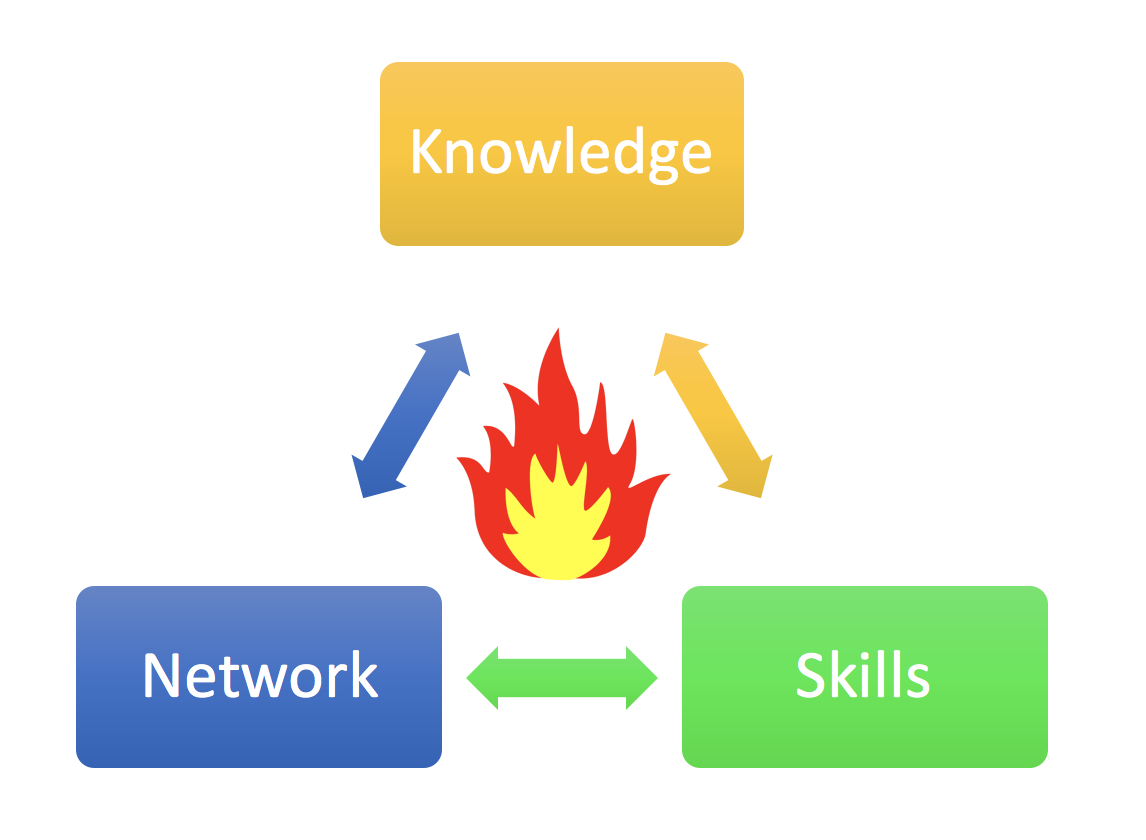In a previous post (What to do when you’re stuck in a rut), I wrote about how the difference between where you are and where you want to be are the books you read (knowledge), the things you do (skills), the people you know (network).
The fire in the diagram below represents your passion and/or purpose which is the energy that drives the entire (already discussed in two parts here and here).
Schools are really good at feeding you the knowledge but don’t do much to help with the other parts. If you happen to grow them during your school years, they’re more of a byproduct than a direct result of your schooling. So this post will delve deeper into growing skills…
There are a lot of ideas on how to bridge the skills gap that exists between industry and academia. The skills gap is a phrase that describes the disconnect between the skills employers seek and those that graduating students have.
1.Higher cognitive skills (Problem-solving, critical thinking and creativity)
In one of his speeches, Neil Degrasse Tyson gave a contrived example, saying if you’re an employer and two candidates are looking for a job, and you ask the candidates about the height of a spire on a given building. Let’s say one of them comes up with the exact answer because he studied it and could remember it. The other one doesn’t know the exact answer but runs outside, measures the shadows of the building and himself and determines the height from the ratio of the shadows.
Who are you going to hire?
He then said, “I’m hiring the person who figured it out even though it took that person longer, and even though that person’s answer is not as precise. I’m hiring that person because they know how to engage the mind in a way not previously engaged. You realize when you know how to think, it empowers you far beyond those who know only what to think.”
Higher cognitive skills are necessary if you want to advance professionally. Following instructions and sticking to your job description can help you keep your job, but if you want to reach the top, you’ve got to know how to innovate, think critically, and most importantly, solve problems. If you read the books written by business leaders Richard Branson, Chip Conley and Ben Horowitz you’ll discover that CEO’s are practically fire fighters. Challenges start fires in their companies and it’s their job to put them out.
So for bibliophiles like myself, there are always books to get you started. The four I know off the top of my head are;
– Thinkertoys by Michael Michalko
– Thinking, fast and slow by Daniel Kahneman
– The Art of Thinking Clearly by Rolf Dobelli
– Predictably irrational by Dan Ariely
However, one thing to remember is you can read all the books, but unless you apply whatever you’ve learnt in real life situations, you won’t be able to reach far.
Be okay with asking lots of questions and experimenting a lot. I think Tim Ferris was the guy who made the concept of running
tiny experiments cool again. He is known to ask himself questions and then run small experiments to see what happens.
Experimentation always comes with the risk of failure, and because of that, not all work environments are conducive of experimentations and some people might not try to do anything different because they’re too scared to get fired.
Generic business questions are;
– What are we trying to achieve?
– What are the limitations?
– How do we achieve what we want given the limitation?
It’s an ideal optimization problem, and I personally witness the contrast in thinking between places like the UAE and Kenya. I’m going to generalize and stereotype here so I apologize in advance but due to the difference in affluence between the two places, it’s very easy for people in the UAE to solve a problem by throwing more money into it.
As for Kenya, due to the scarcity in resources, businesses are forced to think creatively.
A climbing wall in a UAE place would most probably have nice rubber mats lined up at the bottom in case someone falls, but look at what lies at the bottom of an outdoors climbing wall in Karen, Nairobi…

These flip-flop remains are still made of rubber…
Exposure to solutions from different fields. This is where reading, listening to podcasts and mentoring come in handy. Sometimes you don’t have to figure out the solution yourself. Technically, this falls under ‘knowledge’ but developing the habit of exposing yourself to different ways of thinking is a behavior so it could fall under skill (I think!).
One area where technology is doing us a disservice is learning what we like only to throw similar things in our face. Cross-pollinating ideas from different fields is a necessity if you’re going to be creative, but because of the algorithms behind tech products like youtube, you actually need to make an effort to get exposed to random ideas outside of your field.
That’s why I personally like the idea of working from co-working spaces (such as iHub, Nexus Cowork and Nairobi Garage), because you never know who you might run into at the water cooler.
Another thing I personally do is subscribe to the digest of Quora, Indiegogo and Instructables just because I want to see what sort of ideas or questions people come up with.
One of my favorite Quora questions of all times is;
https://www.quora.com/Could-a-person-wrapped-in-enough-bubble-wrap-survive-a-fall-from-an-airplane
Like, how did the person even think of that?
Indiegogo is a crowdfunding website while Instructables is for user-created DIY-projects. Both sites are filled with innovative ideas for products. At some point I started curating my favorite products in a separate blog — 250ideas.wordpress.com…a side project that came to a sudden death thanks to my thesis this year.
2.Sales/Marketing skills
Sales people get a bad rap, but sometimes I feel it all stems out of jealousy from people who can’t naturally sell.
Think about it, if you know how to sell, the market is yours for the taking, because you can sell your company to get funding, you can sell items to make more money…you don’t even have to worry about getting a job because you’ll know how to market yourself.
So this is one skill everybody needs to develop to some extent whether they like it or not, and I personally love how it’s a function of empathy and emotional intelligence more than anything, so even if you suck at selling, developing at the other two is still a plus.
To get better, you just need to expose yourself more. More sales calls. More pitches. More people. Different types of people. There’s really no trick here.
3.Technical skills
This is one area where you’d assume universities should cover but you’d be surprised at the discrepancy between what universities teach and what companies require, so university graduates are forced to go augment their studies by using online courses on Udemy, Coursera and Lynda.
I personally think the system could be improved to help with this;
– By setting up more joint projects between companies and universities
Let’s say a company is facing a certain problem so it approaches a professor in the field and asks them to put their best students to solve that problem as a class project for credit.
There are many benefits of such a system;
– By working on real-world problems, students will be more engaged, because they’re no longer wading in the river of theoretical problems. They’ll take it more seriously because what they’re doing actually matters to someone — or someone’s bottom line rather.
– Working side by side with people in industry, students actually get to see the innards of these corporations and decide early on if they want to continue in that field
– They gain the job experience required to break the catch-22 situation older generations faced when companies wouldn’t hire new graduates due to lack of job experience and new graduates couldn’t get the job experience if nobody would hire them. can’t get the job experience if nobody hires them.
– Students tend to be hungrier and more creative than mid-career employees who’ve been in the system for too long. They might actually have insightful ideas.
– After hiring students they worked with before, corporations wouldn’t need to spend that much money training to close the skills gap
There are additional skills such as people skills, communication skills, etc…but I won’t talk about those.
Last but not least, learning how to learn is the one skill that is really important for the 21st century. Technology will keep on advancing, and things will keep on changing, which means you’ll need to know how to pick things up quickly.
So what skills are you developing today?
Love this post? Share it with your friends on facebook.
Follow me on Instagram and twitter on @ahechoes
and subscribe to the newsletter here; [mc4wp_form id=”680″]
Image via pixabay.com

